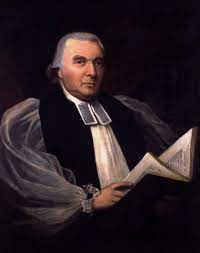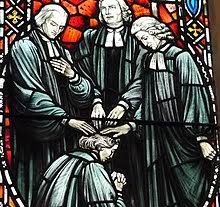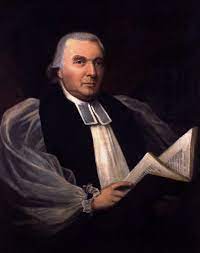 St Alban’s Episcopal Church Bolivar, Missouri Monday, November 14, 2022 A famous bishop you should know(and thanks to Hamilton, you just might) Samuel Seabury (1729-1796)The Consecration of Samuel Seabury our first American bishop November 14, 1784  Samuel Seabury 1729-1796 Samuel Seabury was the first bishop for the American Anglican/Episcopal church.It’s a fascinating story. He was born in Connecticut, but had been ordained in 1753 at the age of 24 in England, (as all Anglican clergy were; there were no Anglican bishops in the colonies). After returning to the colonies, Seabury served several churches in New Jersey and New York. He remained steadfastly loyal to the British crown throughout the Revolution, and served as chaplain to the British army. After the Revolution, however, he did not go to Canada as many loyalists did, but remained to serve in the new country. On March 25, 1783 a secret meeting of the Connecticut clergy selected him to go to seek Episcopal ordination in England. The American part of the Anglican church would not be able to efficiently continue without a resident bishop to ordain other clergy. He went, but even though he spent a year in negotiations, he was unable to be ordained/consecrated bishop because as an American citizen he couldn’t swear allegiance to the crown. Finally he turned to the Episcopal Church in Scotland and was consecrated bishop on November 14, 1784 by three Scottish bishops in the presence of clergy and lay members of the Church. He was finally recognized as Bishop of Connecticut on August 3, 1785. With Bishop William White he was he was active in the organization of the (American) Episcopal Church at the General Convention of 1789. He participated in the first consecration of an Anglican/Episcopal bishop on American soil at the General Convention of 1792 – of John Claggett of Maryland. Seabury died on February 15, 1796. He remained patient and faithful -and for that we give thanks and praise. Who is ever on “the right side of history?” Hamilton vs Seabury If you loved the musical, Hamilton, you might think you know Samuel Seabury. He comes off badly, rather like a fool, which, of course is how Hamilton himself viewed him. Seabury was not a fighter. He had no stomach for the war, or for separation from England, or for the fiery rhetoric of the young revolutionaries. After the Revolution, though, he stayed to help create the Episcopal Church in America while many of his colleagues went to Canada or back to England. So was he on the “wrong side” of history? So was he on the “right side” of history after all? Or does history even have a “side?” The reality is that we often do not know where history is going – or what the “right” side of history is going to be in the future. And in his case, the question was even less clear cut than it is for us. We know that Hitler was “on the wrong side,” and Pol Pot, and Stalin. We know that genocide is wrong. But Americans are less clear about Putin and Zelensky; opinion is divided about which one is “right.” And in the US today we have open political, verbal warfare between those who believe that conspiracy theories are real and those who discount them, between those who believe there is massive voter fraud and those who trust our election process – and between those who believe that Joe Biden is actually our duly elected president and those who do not. After 200 years it is quite possible to wonder if the American experiment in a king-less democracy “of the people, by the people, and for the people” will hold. It is possible to wonder if Seabury and the loyalists were right – that a Constitutional monarchy was better than what we have right now where uncertainty and unsteadiness seem to rule. One thing we do know is this Samuel Seabury, the loyalist, saw his political cause lose. But Samuel Seabury the Christian, saw his cause not only survive, but thrive.He loved God more than England, and his people more than his political convictions, and he remained in the new nation to serve them both. He did what he knew to be right, regardless of the way the political winds blew, and we have no reason to believe he would have done otherwise had the Revolution failed. We have no control over much of history, even the history of our own times. We are all bit players. We do what we can. We vote as we believe is right. And we trust God. |

Categories:
Tags:
No responses yet